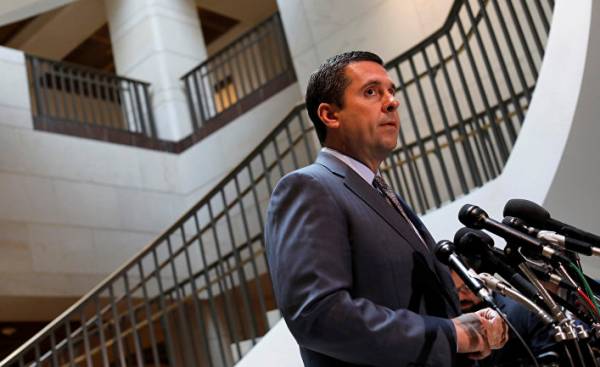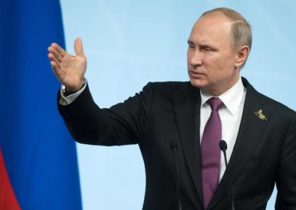
“Is it true that Russians have always preferred a Republican victory over the Democrats”?— the emergence of one question from the Chairman of the house Committee on intelligence, U.S. Congress, Devin Nunes. He faced obscure the debate on the controversy regarding Russia’s interference in American elections. These discussions are so vague that they can hardly say anything definite, given that they were conducted mainly at the sidelines of the intelligence agencies and house of representatives of the Congress of the United States. But in the mass of information has been leaked because one of the members blurted out a few classified facts. Disputes would not arise if the New Yorker correspondent Ryan Lizza not grasped the subject and not told about it all I could find out. Intelligence, apparently lost in thought about the views of Russia in American politics — that is, the views of the Russian government. And in the course of reflection on this subject, the impression that the offices of us intelligence, there was talk that the elections in the US, Russia has historically always preferred the victory of the Republicans, not the Democrats.
But is it? It raises the question of Devin Nunez. The reference to such preferences clearly caused the skeptical attitude of the Committee of nuñez, which led to concerns about the intelligence services and their political reasoning.
Lizza in the articles of the New Yorker expressed his own skepticism that led him to formulate the above question and address it to someone who might know the answer. He was well-known defector from the KGB Oleg Kalugin. If Russian in the past preferred the role of the ruling party of the Republicans? “No, it’s not so,” replied the journalist Kalugin. “We have always supported Democrats.” He explained that democratic Russia is always considered reasonable.
I don’t have any information on past or present manipulations of Russia, but my response to the article by Lizzy and disputes on the issue, in any case, is in skepticism for skepticism. I wonder whether we have forgotten Kalugin and other skeptics one snag in the political history of America. Over the last 50 years the Republican party has always adhered to the two schools of foreign policy thinking — the hard school of the cold war and the Kissinger school. For decades, proponents first wanted to free the poor of Russia’s neighbors and, if possible, to reduce or even to overthrow the despotism within the country. The goal of the adherents of the school of Henry Kissinger has always been distinguished. During the time of Nixon, when Henry Kissinger was national security Advisor and U.S. Secretary of state, they wanted to force Russia to agree to become a great power in a conservative rather than a revolutionary option; all they required. They wanted Russia has refrained from the expansion of the rule in Western Europe and the rest of the world and were content with domination exclusively in your region and in your own manner.
So what is the Russian attitude to Republicans? Depends on the circumstances. The Russians had every reason to dread to look back at the hardliners of the school of the cold war. Respectful to the representatives of the Kissinger school grounds were much as they were willing to limit the ambitions with respect to its own vast territories. And then the question arises: whether in Soviet times, Russians went so far as to interfere in the American elections on behalf of the Republican party in prevailed then kissingerism environment? This in fact is the specified Devin Nunez question, with the exception of some clarifications from my side. And I can answer: Yes.
We are talking about the election of 1972. One would assume that choosing between Richard Nixon and George McGovern, Russian — that is, the Soviet — people would certainly prefer the latter. But this did not happen, and the reasons are obvious. During his first term, Nixon advocated a policy of “détente” that was a breakthrough in the cold war years. Discharge this was a compact, spreading on both sides. From the American side, Nixon wanted the consent of the Union to the rejection of attempts to convert the world, and especially Western Europe (although Nixon, of course, recognized the absence of the Soviet Union any radical interests that could be promoted in the framework of the law and no one, of course, did not expect the failure of the Union from his political rhetoric). In exchange, Nixon agreed to close a revolutionary project, involving the attempted coup in the Soviet Union and the Eastern bloc (the failure of America from their political rhetoric, too, no one was waiting).
In short, none of the parties would not attempt to overthrow another, which would lead to the improvement of their relations — that was the essence of “discharge”. Nixon has shown himself faithful to his cause, despite the high political price. A well known example: in 1975, Alexander Solzhenitsyn came to America and brought with him literary labors, to testify against the crimes of communism. Nixon, on the advice of Henry Kissinger refused to accept it, but taken in the American Federation of labor and Congress of industrial organizations in Washington, DC. The leaders of the AFL-CIO were the classic representatives of the school of the cold war, for many years, hoping to overthrow the Soviets, and absolutely right that Solzhenitsyn and his works could contribute. Taking Solzhenitsyn in their ranks, AFL-CIO “clicked” Nixon’s nose, he must have not liked it. But he knew that if I shook the writer’s hand or took it to the White House, the Soviets would have regarded it as a betrayal. So he refrained from such a step. It could rely on.
What Advice? Were there and they are faithful to tacit agreement? Are they too tried to give Nixon to feel betrayed? The history of the elections of 1972 speaks for itself.
Sometimes forgotten is the fact that throughout its history, the Soviet Union possessed more or less of the surface intervention mechanism in the case of America, which is the Communist party USA. The Communist party was not so successful in the question of intervention, except for a few moments in the 1930’s and 40-ies, in connection with which the machinations of this party in memory of America is not delayed. But not so, apparently, insightful Tips continued to believe in the Communist party and its political prospects, and even had high hopes for the Communist doctrine — perhaps because for many years the General Secretary of the party was Gus Hall, repeatedly visited Moscow, where he deftly promoted his party, its reputation and interests. And the Soviet Union acted according to their beliefs. With his part of the money appropriation of the Communist party USA was more than any other party in the world, including the French Communist party, which in the 1980-ies poured about two million or more dollars a year until the crisis of communism in 1987.
Now about the re-election of Nixon. Campaign Nixon put the Communist party in the same awkward situation in which he himself once was, thanks to Solzhenitsyn. From the comments Kalugin we can assume that in 1964 and 1968, American Communists supported the Democratic party. But in 1972, after Nixon devoted his first term policy of “detente”, the leaders of the Communist party could hardly refer to his generous patrons in the Soviet Union and to explain that the Communists in the US is going to withstand all the forces of the dictator and overthrow him. On the other hand, the Communist party of America would have looked ridiculous openly speaking in support of the Republican party. What should I do? The Communist party nominated its own representative in the person of Genesee Hall as a candidate for President. The idea was to destroy the expectation McGovern, depriving Democrats of not only the Communist electorate, though not as extensive, but any advantages of the apparatus and press of the Communist party, which had a certain weight across the country and not always under the name of communism.
On the other hand, the Communist party also decided to weaken party discipline, thereby allowing its members and supporters — if you wish to campaign for McGovern and the Democrats. The move was necessary because, even if the Communist party was a shadow of itself in the 30s-40s years, several groups of the labor movement retain loyalty in particular, the Union longshoremen of the West coast along with random groups in other trade unions. The party was not going to disperse these people. This position is supported Gus Hall and was considered ponikarovsky maneuver to the terms of the Communists of the ability to maintain a reputation among the labor movement. I have no idea whether doing Tips something else or something more adventurous on behalf of Nixon. It is absolutely obvious that one way or another, someone in Moscow — some Committee or the Bureau, realizing how important was the provision to the Secretary General of the United States and his party, — made it is likely that many efforts to assess the challenges the elections of 1972 and to understand how the most efficient use of resources of the USSR.
Has any of these past events relevant to the current situation? I think the name is Kissinger should remind us that the time between past and present was not so much. Kissinger himself no influence in the administration of the trump does not even if I had lunch with Rex Tillerson. Nevertheless, Donald trump clearly offered the Russian Federation “discharge”, though not so fine, as Kissinger and Nixon. Vladimir Putin has every reason to answer it, using the assets of Russia with the purpose of manipulating the political situation in America. Being “old school KGB” Putin must be took into account that Moscow has a certain experience in carrying out similar manipulations in the United States. This experience teaches that the preference for the Republicans, not the Democrats, it is better to have when the Republican party comes into kissingerism phase: political precedent in 1972. And, look, for the first time since 1919, the Russian experts on the manipulation of American politics finally got to the point — no more than luck, but, as they say, is afraid of the master.






